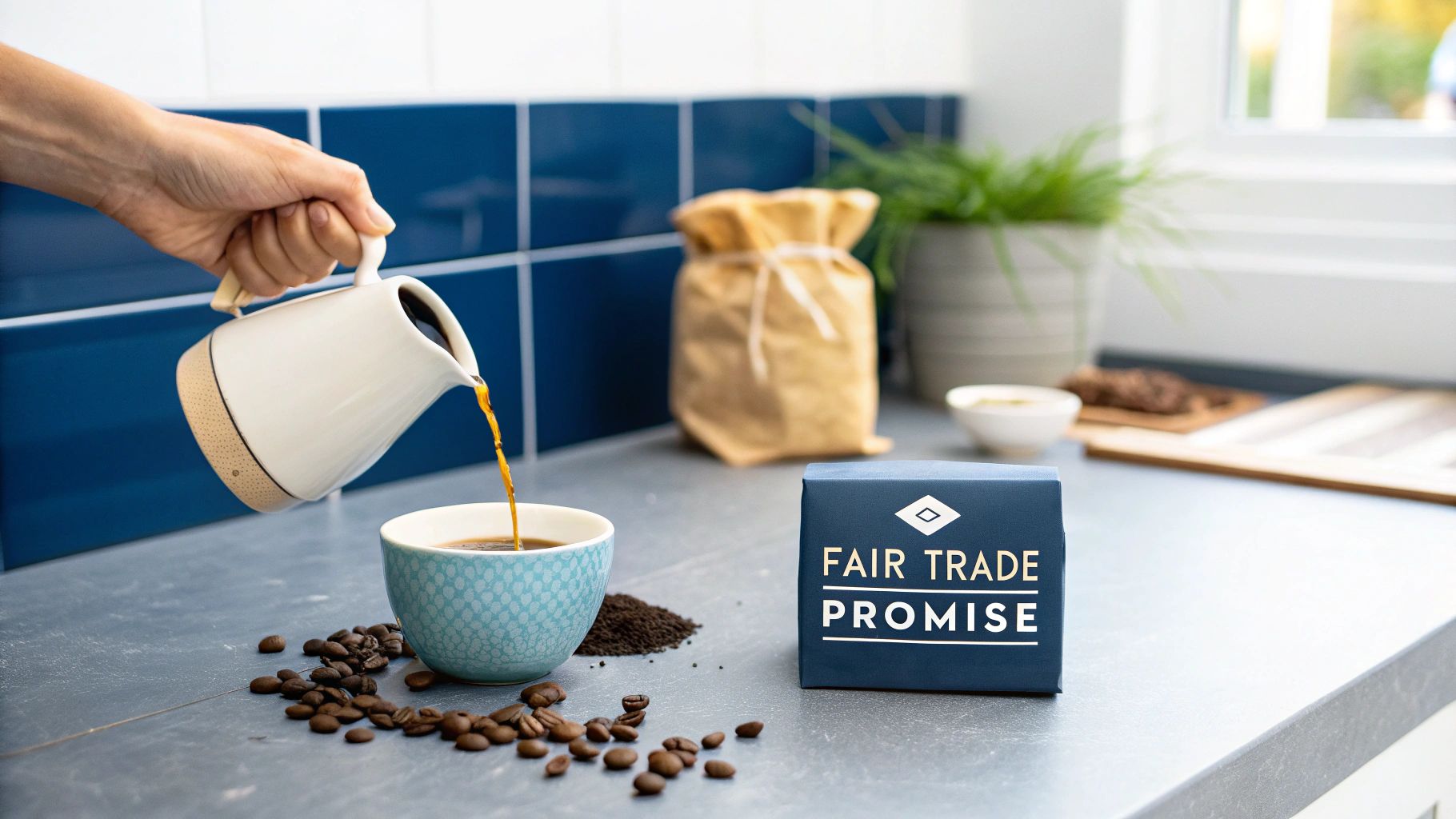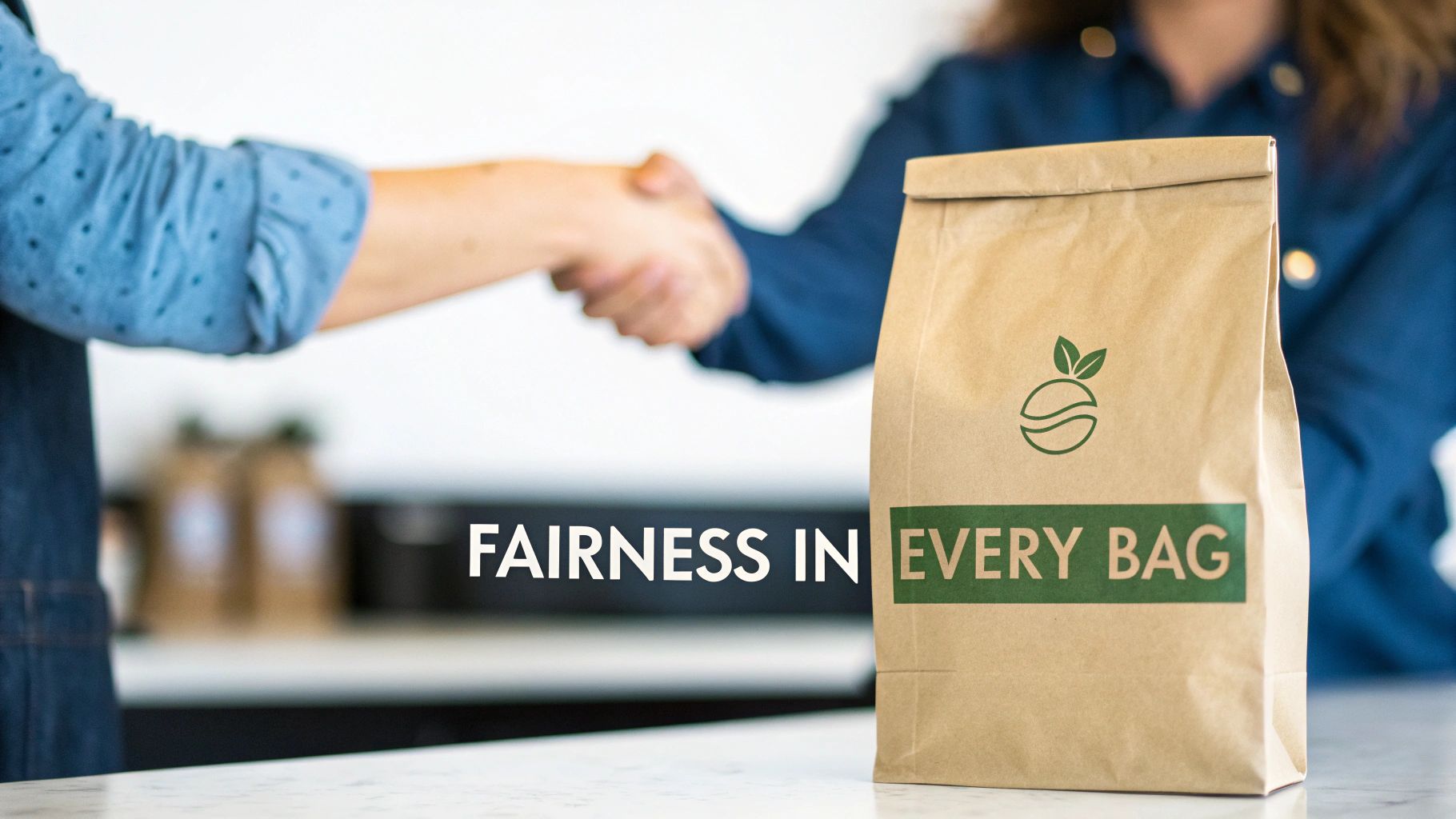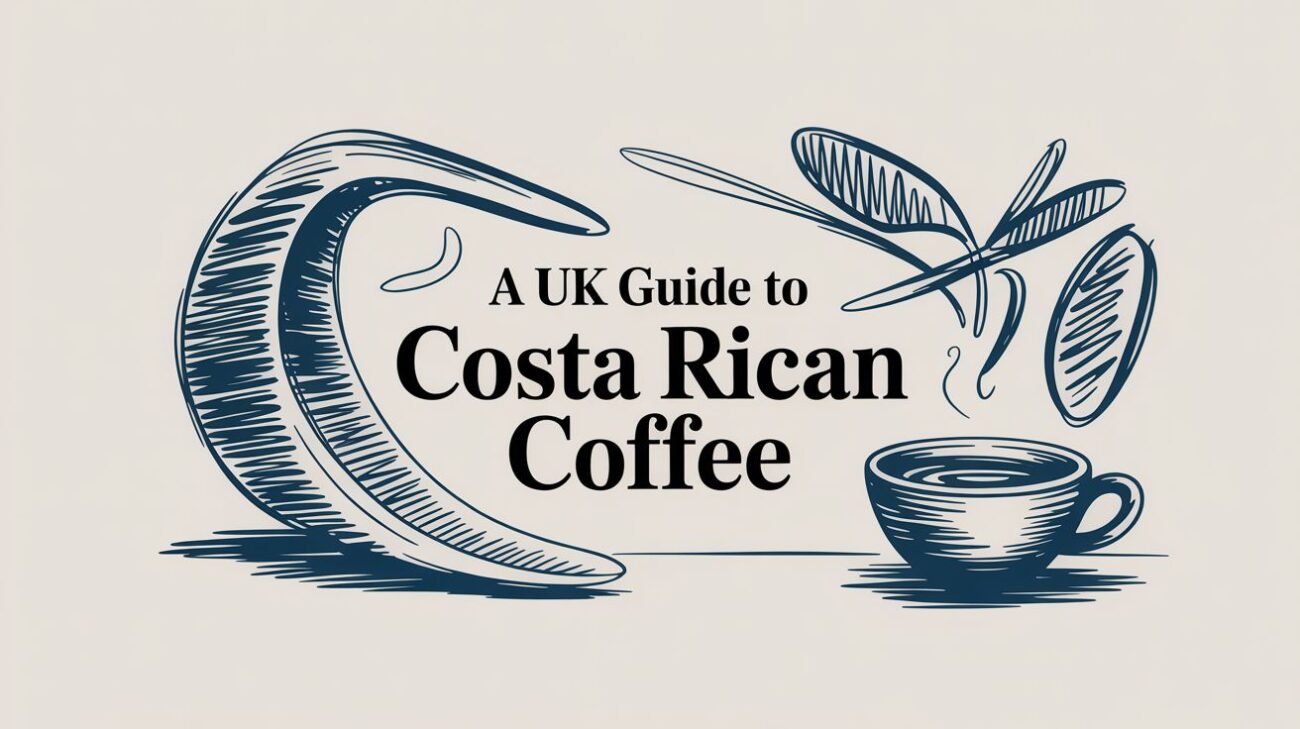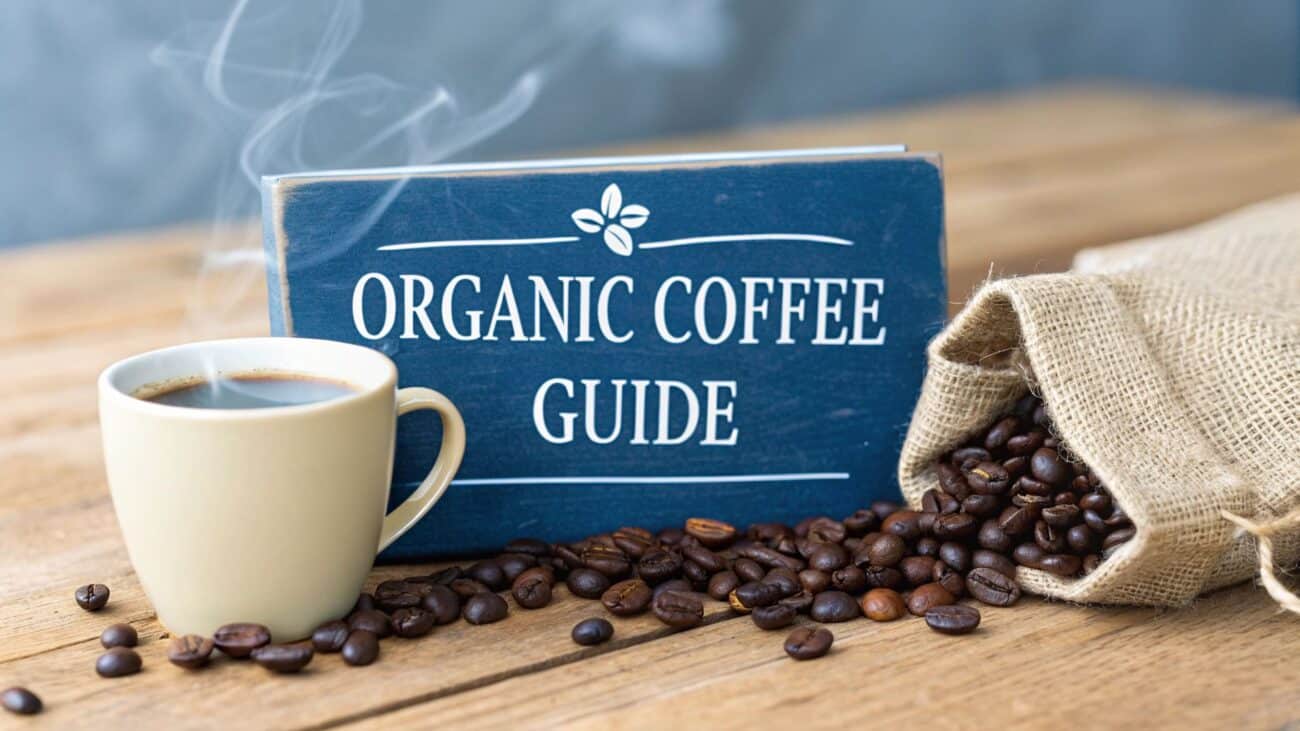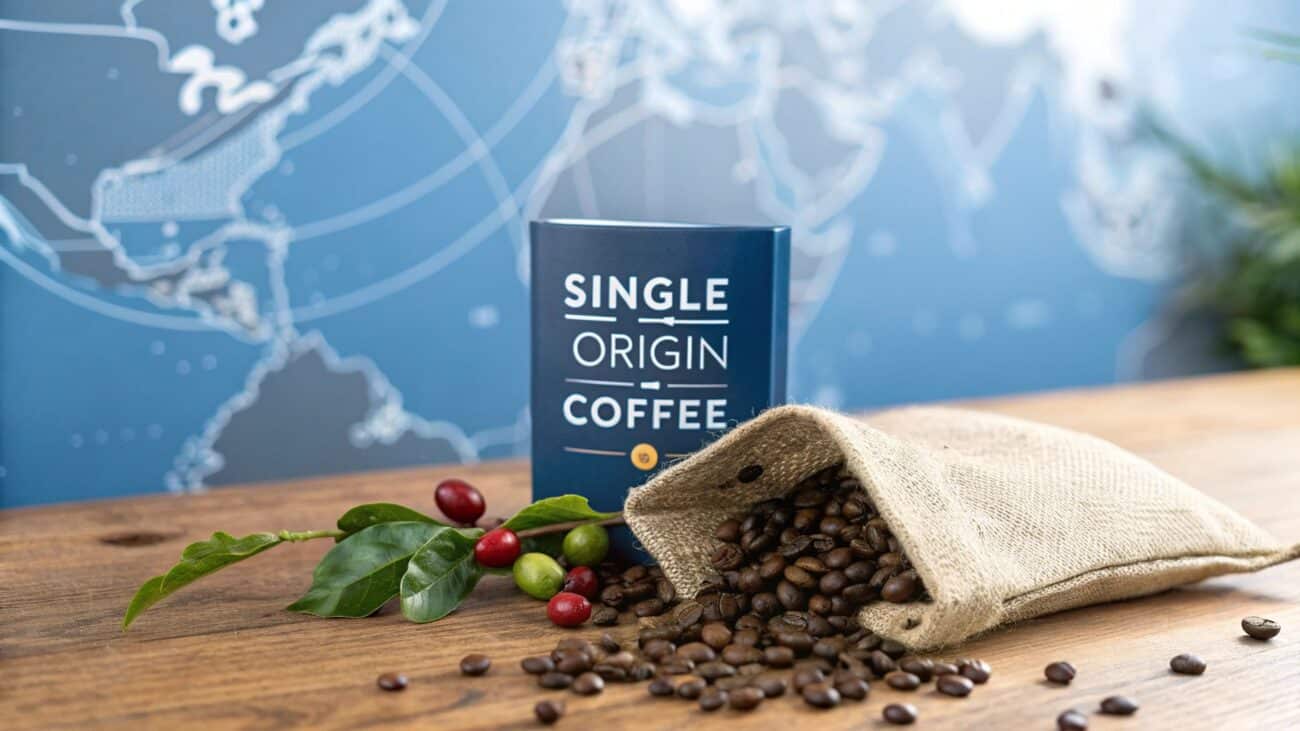What Is Fair Trade Coffee Explained
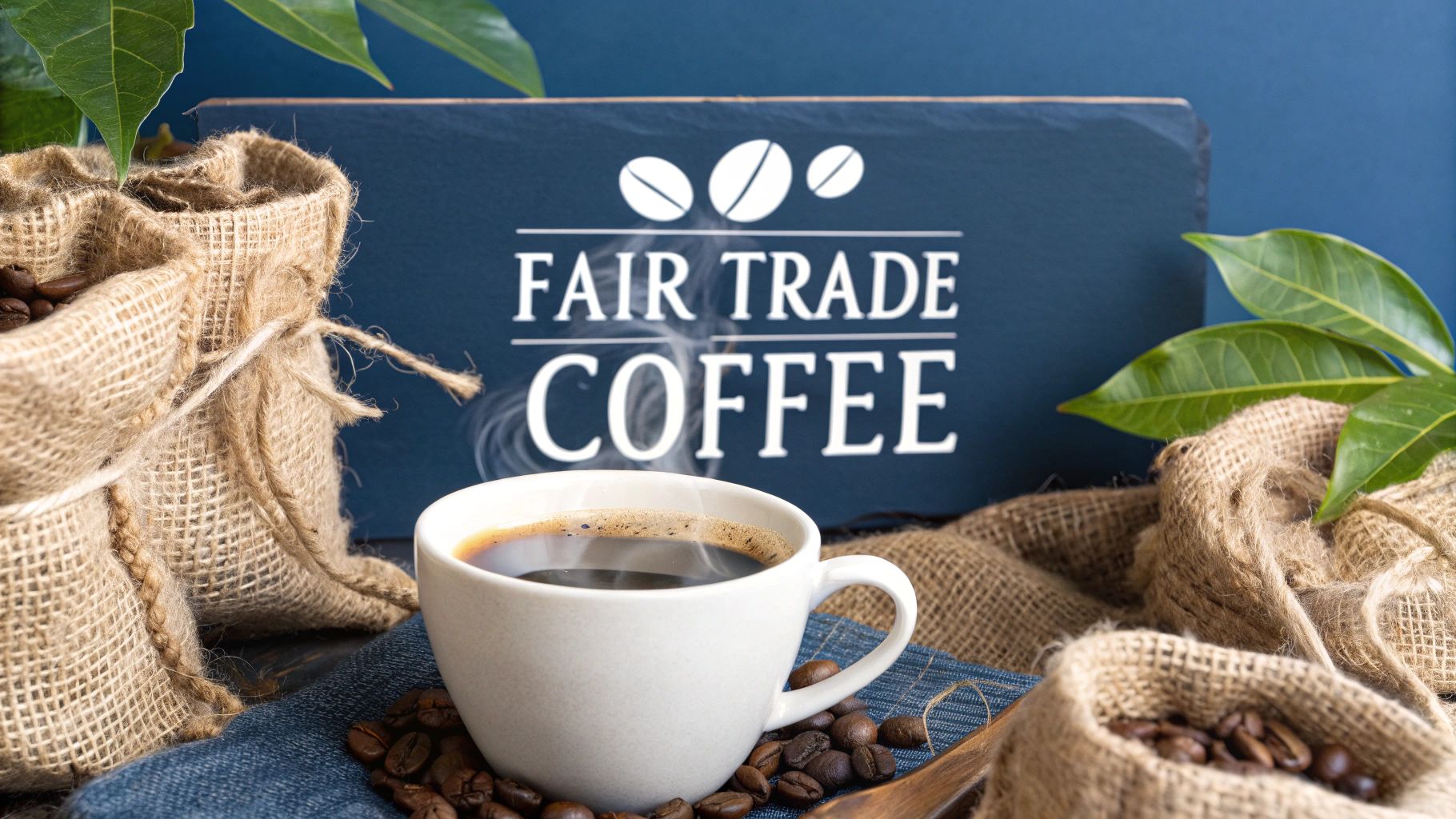
Simply put, Fair Trade coffee is our guarantee of a better, fairer deal for the people who grow our favourite beans. Think of it as a promise that farmers receive a fair, stable price, protecting them from the wild market swings that can devastate their livelihoods and communities.
What Fair Trade Means for Your Morning Coffee
At its heart, Fair Trade is both a global movement and a rigorous certification system. It's designed to give coffee farmers a crucial safety net, ensuring they can always cover their production costs, invest back into their farms, and plan for a more secure future. This whole approach champions ethical practices right from the very start of the supply chain.
When you spot the FAIRTRADE Mark on a bag of coffee, it’s a clear signal that the beans inside have met a strict set of standards. These aren't just arbitrary rules; they are carefully designed principles that tackle some of the biggest challenges in the coffee industry head-on.
The Core Pillars of Fair Trade
The entire system is built on key commitments that ensure fairness and sustainability are baked into the process. For farmers and workers, this translates into real, tangible benefits that go far beyond a single good harvest. The main goals are pretty straightforward:
- Economic Stability: A Fairtrade Minimum Price acts as a buffer when market prices plummet. This ensures farmers are never paid less than the sustainable cost of production, which is a massive deal.
- Community Development: An additional sum, known as the Fairtrade Premium, is paid directly to the farmers' cooperative. The farmers themselves vote on how to invest this money in projects that matter to them, like building new schools, getting clean water access, or improving local healthcare.
- Environmental Protection: The standards also encourage environmentally sound agricultural practices. This means protecting biodiversity, promoting sustainable farming, and restricting the use of harmful agrochemicals. You can learn more about how this connects with our carefully sourced organic coffee beans in the UK in our dedicated guide.
To really see the difference, it helps to put the two models side-by-side.
Fair Trade vs Conventional Coffee At a Glance
The table below breaks down the core differences between the principles behind Fair Trade and what often happens in the conventional coffee market.
| Principle | Fair Trade Coffee | Conventional Coffee |
|---|---|---|
| Pricing | Guaranteed minimum price to cover sustainable production costs. | Prices fluctuate with the global market, often falling below production costs. |
| Community Investment | A Fairtrade Premium is paid for community-decided projects. | No structured premium; community investment is rare and inconsistent. |
| Environmental Standards | Encourages sustainable farming, biodiversity, and restricted chemical use. | Standards vary widely; often prioritises high yield over sustainability. |
| Worker Rights | Promotes safe working conditions and fair labour practices. | Labour conditions can be poor, with little oversight or protection for workers. |
| Transparency | Certified supply chains ensure traceability back to the cooperative. | Supply chains are often complex and lack transparency. |
This comparison makes it clear that Fair Trade isn't just a label—it represents a fundamentally different way of doing business that prioritises people and the planet.
By choosing Fair Trade, you are directly contributing to a system that empowers farmers, protects the planet, and fosters a more transparent and equitable coffee trade for everyone involved.
At Seven Sisters Coffee Co., these principles aren't just a box-ticking exercise; they are absolutely central to our philosophy. We believe that a truly great cup of coffee is one that tastes good and does good, which is why we proudly partner with farms that uphold these values. Your choice really does make a world of difference.
The Human Story Behind Every Bean
To really get what fair trade coffee is all about, you have to look past the label on the bag and into the lives of the people who grow it. Picture the journey of a single coffee bean, starting on a tiny farm thousands of miles from your kitchen. Its path can follow one of two completely different realities, and the system it's part of makes all the difference.
First, imagine a farmer trying to make a living in the conventional market. Their entire year's income is tied to a global commodity market that can plummet without warning. They often end up with just a tiny fraction of what you pay for your flat white—a price that can easily drop below what it even cost them to grow the beans in the first place.
This constant uncertainty makes it nearly impossible to plan for the future. Things like investing in better farming equipment, fixing a leaky roof, or saving for their children's education become distant dreams when they're not even sure they'll break even at the end of the harvest.
A Different Path Through Fair Trade
Now, let’s look at a farmer who's part of a Fair Trade cooperative. Their story is fundamentally different. Thanks to the guaranteed Fairtrade Minimum Price, they have a vital safety net that shields them from those devastating market crashes. They can plant their crops knowing their hard work will be rewarded with a fair, stable income.
But that's not where the story ends. On top of this stable price, the cooperative also receives a Fairtrade Premium—an extra pot of money for the community to invest however they decide. This is where the real, lasting change begins.
This premium is empowerment in action. Farmers collectively decide how to use these funds, transforming their communities from the ground up. It’s not a handout; it’s a tool for self-determination.
The impact of this premium is real and life-changing. It leads to tangible benefits that create a ripple effect of progress right across the community:
- Education: A new school gets built, so children no longer have to walk for miles just to get an education.
- Healthcare: A local health clinic is set up, giving families access to medical care that was previously out of reach.
- Infrastructure: Clean water wells are dug, or new roads are built to connect the village to bigger markets.
- Better Farming: The cooperative might invest in shared equipment or training on sustainable farming techniques, improving crop quality and yield for everyone. Exploring different single origin coffee beans often reveals the incredible quality that comes from these kinds of investments.
The UK’s Role in This Story
This isn’t some far-off tale; it's a story that coffee drinkers here in the United Kingdom are helping to write every single day. The coffee you choose for your morning brew has a direct and powerful impact on these farming communities.
In fact, around 25% of all coffee sold in the UK is certified as Fair Trade, which makes it one of the world's leading markets for ethically sourced coffee. That's a powerful statistic showing a real demand for products that ensure producers are paid fairly and can build sustainable lives for themselves. You can find more insights into this growing consumer awareness at cornercoffeestore.com.
By choosing Fair Trade, you become an active part of this positive story. You help ensure a farmer can not only survive but actually thrive, empowering them to build a brighter future for their family and their entire community.
Understanding the Fair Trade Standards
When you see the FAIRTRADE Mark on a bag of coffee, it’s not just a nice-to-have symbol. Think of it as a promise—a guarantee that the coffee inside has passed a tough, independent audit covering everything from farmer pay to environmental care. This isn’t about vague, feel-good marketing; it's a solid framework for genuine change, built on three core pillars that every producer must follow to earn that certification.
At its heart, the system is designed to bring some much-needed stability to a market that’s famous for its wild price swings. It’s not charity. It’s about levelling the playing field and creating a fair trading partnership that gives farmers a fighting chance from day one.
The Pillar of Economic Stability
The cornerstone of the whole system is the Fairtrade Minimum Price. This acts as a crucial safety net. If the global coffee market suddenly crashes, this minimum price ensures farmers are still paid enough to cover their average costs for sustainable production. It’s a simple but powerful defence against the cycles of poverty that can trap farming communities for generations.
But it doesn't stop there. On top of this price, cooperatives receive the Fairtrade Premium—an extra sum of money paid directly to their organisation. This is their money, to invest as they see fit in their businesses or community projects.
This infographic gives a great visual breakdown of how that premium helps communities take control of their own future.
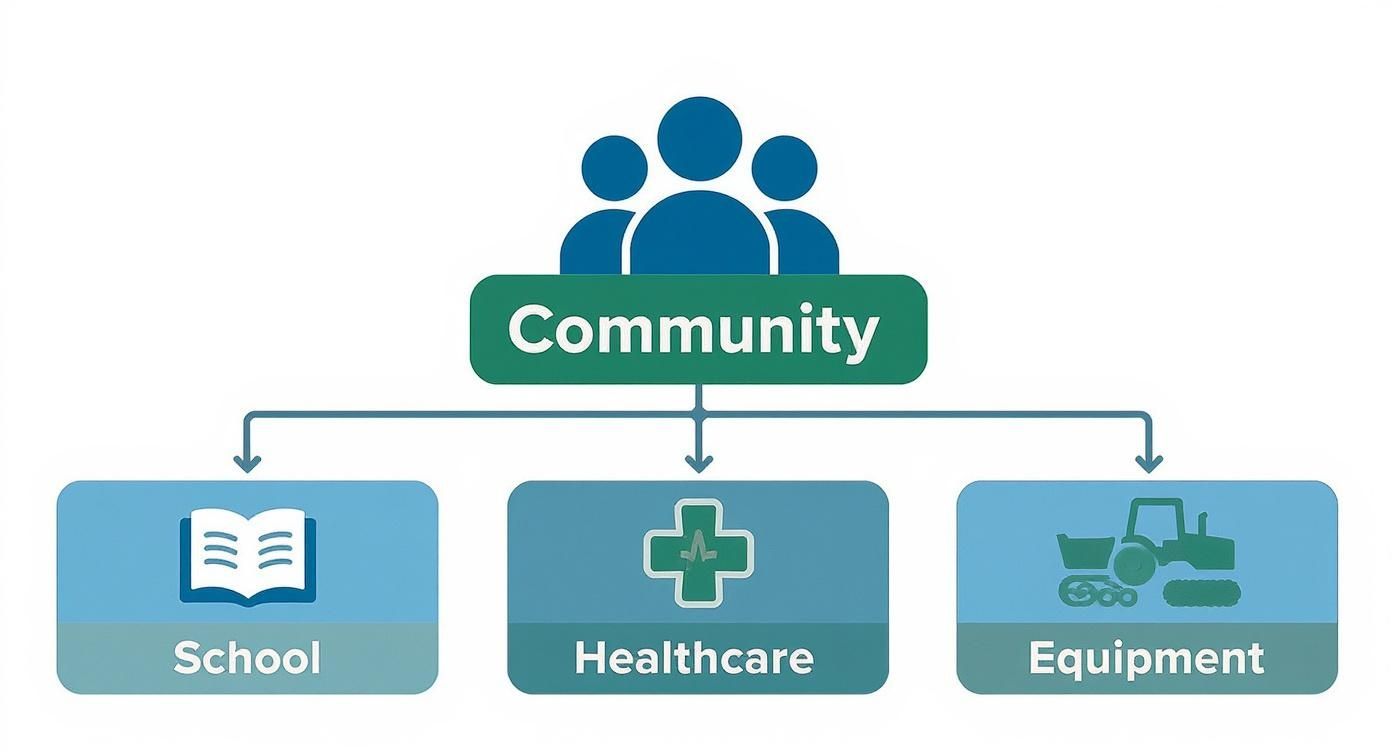
As you can see, the funds are used democratically to build things that matter, like local schools, healthcare clinics, and better farming equipment.
The Pillar of Social Development
Beyond the money, Fair Trade sets strict social standards to protect the very people who grow our coffee. These rules are non-negotiable and form the ethical backbone of the entire model.
Some of the key social requirements include:
- A Ban on Forced and Child Labour: Policies are rigidly enforced to make sure all work is voluntary and performed by adults.
- Safe Working Conditions: The standards demand a safe and healthy environment for everyone on the farm, cutting down on workplace risks.
- Democratic Organisation: Farmers have to be organised into cooperatives or associations. This structure gives them a collective voice and the power to make decisions together.
These standards ensure the entire journey, from the coffee cherry to your morning cup, is one defined by dignity and respect.
The Pillar of Environmental Protection
Lastly, the standards tackle the health of our planet. Fair Trade champions farming practices that are kinder to the local ecosystem and help secure the future of coffee itself. These environmental rules push for agricultural methods that are better for the earth and safer for farmers.
This means encouraging the protection of biodiversity, promoting sensible water use, and putting strict limits on harmful pesticides and chemicals.
This deep commitment to the environment means that choosing Fair Trade is also a vote for a healthier planet. It’s a recognition that fantastic coffee and a thriving ecosystem go hand in hand.
If you're interested in how these ideas of quality and ethics connect, you can learn more about what is specialty coffee in our other guide. When you put them all together, these three pillars create a powerful, robust system that delivers real, positive change you can taste and feel good about.
The Ripple Effect of Choosing Fair Trade
When you choose Fair Trade, the impact doesn’t just stop with one farmer getting a fair price. It sets off a powerful ripple effect, sending waves of positive change through entire communities and even the local environment. It’s a beautifully simple idea: one ethical choice can lift up many.
It all starts with empowering farmers. Under the Fair Trade system, farmers often band together to form cooperatives, giving them a much stronger, collective voice in the global coffee market. This isn't just about selling beans; it’s about building a community with a shared purpose.
This collective strength opens doors that would otherwise stay firmly shut. Cooperatives, for instance, can secure credit and financial services that are often out of reach for individual smallholder farmers. This allows them to invest in better equipment and training, which boosts both the quality and quantity of their coffee over the long haul.
Building Resilient Communities
The stability that comes from the Fairtrade Minimum Price, along with the extra investment from the Premium, lays a foundation for real long-term planning. Farmers can finally look beyond a single harvest and start building a more secure future for their families.
This is where you can really see that ripple effect in action. The investments made by the cooperative benefit everyone, not just the coffee farmers.
- Community Infrastructure: Funds are often channelled into building essentials like local schools, better roads, or healthcare clinics.
- Economic Diversification: Some cooperatives invest in projects to create other income streams, making the community less vulnerable to the whims of a single crop.
- Empowering Women: Fair Trade standards actively promote gender equality, creating leadership opportunities for women within the cooperatives.
Nurturing a Healthier Planet
The ripple effect extends beyond people to the planet itself. The environmental standards baked into Fair Trade certification are there to protect the delicate ecosystems where coffee thrives. These aren't just vague guidelines; they are strict requirements that make a tangible difference on the ground.
These standards encourage farmers to shift towards more sustainable agricultural methods that protect the environment for generations to come.
By championing biodiversity and restricting harmful chemicals, Fair Trade helps preserve the natural world. This means cleaner water, healthier soil, and a smaller ecological footprint for every single bag of coffee.
The demand for this kind of sustainable coffee is growing fast here in the UK. With around 98 million cups of coffee consumed daily, the choices we collectively make really do matter. In fact, nearly 25% of UK consumers now say sustainability is a key factor in their purchases, and many are willing to pay more for coffee that guarantees fair pay for farmers.
The choices we make as coffee drinkers have a huge impact, creating a positive feedback loop. Sustaining this momentum often involves creative thinking, and exploring effective strategies for coffee shop loyalty programs can amplify the benefits for fair trade communities even further.
Ultimately, when you choose Fair Trade, you’re not just buying coffee; you're supporting a cycle of positive change that benefits everyone, from the farmer to the planet. You can explore our range of ethically sourced specialty coffee beans to be part of this impact.
How We Put Fairness First in Every Bag
For us at Seven Sisters Coffee Co., Fair Trade isn’t just a sticker on a bag; it's woven into the very fabric of who we are. This is where those global principles we’ve talked about become our local promise to you. We've always believed that a truly exceptional coffee has to do more than just taste incredible—it has to make a positive impact.
That commitment starts thousands of miles away, long before the beans even see our roastery. We make a point of partnering directly with Fair Trade certified cooperatives and farms. We look for partners who don't just tick the boxes but genuinely live and breathe the spirit of fairness and sustainability.
Forging these direct relationships is crucial. It’s how we build trust, guarantee transparency, and see for ourselves how the Fair Trade system is empowering communities on the ground.
From Their Farm to Your Cup
Every coffee we bring you has its own story, deeply rooted in the land and the people who grew it. By sharing these stories, we hope to connect you to the journey behind your daily brew. When you choose our coffee, you're not just buying a product; you’re stepping into a fairer, more transparent supply chain.
Think about the vibrant beans we source from a cooperative in Peru. Your purchase helps fund agricultural training, giving farmers the skills to improve their crops and build a better future. Or consider our Ethiopian coffee, where your choice contributes to community-led projects bringing clean water to local villages. You can dive into the rich narratives behind our coffees by exploring our single origin coffee beans.
Each bag is a vote for a more equitable coffee industry. Your choice sends a clear message that you support a system built on respect, dignity, and shared prosperity.
The Growing Movement for Ethical Coffee
This dedication to ethical sourcing is more important than ever, especially here in the UK. The demand for coffee that does good isn’t a passing trend; it’s a powerful movement driven by thoughtful consumers just like you.
Market analysts predict significant growth in the UK coffee market, and a big part of that is fuelled by the rising demand for ethically certified coffee. This shift shows a wider desire for sustainability and knowing where our products come from. As you can discover in more detail at freshdi.com, conscious consumption is on the rise.
By choosing Seven Sisters Coffee Co., you’re joining a growing community that believes in making a difference, one delicious cup at a time.
Common Questions About Fair Trade Coffee
Even with a good grasp of what fair trade means, it's normal to have a few lingering questions. Let's be honest, this corner of the coffee world is swimming in confusing terms and a few myths. We've gathered some of the most common queries we hear to help you feel confident in your choices as a conscious coffee drinker.
Our aim is to cut through the jargon, clear up any confusion, and give you the clarity you need. By the end, you'll feel even better about the positive impact hiding inside your morning cup.
Does Fair Trade Coffee Taste Better?
This is a great question. While the Fair Trade certification itself is all about ethical and economic standards—not specific flavour notes—there's a very real link to higher quality. The system simply creates the right conditions for farmers to produce better beans.
Think of it this way: the steady income from the Fairtrade Minimum Price, combined with the extra investment from the Premium, lets farmers put money back into their land. They can finally afford better processing gear, invest in training on advanced farming techniques, and really focus on nurturing healthier coffee plants. This level of care and investment almost always leads to a superior tasting cup. In fact, many Fair Trade coffees are also speciality-grade, which speaks volumes about their quality.
Is Fair Trade the Same as Organic or Direct Trade?
This is a huge point of confusion, but they are three completely separate systems, even though you might see them overlap on the same bag. One label doesn't automatically mean the others are included.
- Fair Trade: This certification puts social and economic fairness first. It’s all about making sure farmers and their communities get a fair price and can build a sustainable future.
- Organic: This is purely an environmental certification. It guarantees the coffee was grown without synthetic pesticides, herbicides, or fertilisers, focusing entirely on the health of the ecosystem.
- Direct Trade: This describes how a roaster sources their coffee—buying it straight from a farmer or cooperative. While it can build brilliant relationships, it doesn't have the independent, third-party checks and community-wide standards that are at the heart of the Fair Trade system.
In short, each certification tackles a different piece of the puzzle. Fair Trade is for the people, Organic is for the planet, and Direct Trade is about the purchasing relationship.
Why Does Fair Trade Coffee Cost More?
That slightly higher price you might notice on a bag of Fair Trade coffee isn't just a random markup. It’s a true reflection of what it actually costs to produce that coffee in a sustainable way—an investment in a much fairer system from the ground up.
That small extra amount directly funds two crucial parts of the system. First, it upholds the Fairtrade Minimum Price, which acts as a vital safety net to shield farmers from volatile market crashes. Second, it pays for the Fairtrade Premium, that extra fund given to the cooperative for community projects like schools or clinics. So, you’re not just paying for coffee; you’re investing in the farmers, their communities, and the long-term health of the entire coffee industry.
How Can I Be Sure a Coffee Is Genuinely Fair Trade?
The easiest and most reliable way to know if your coffee is the real deal is to look for the official FAIRTRADE Mark on the packaging. This instantly recognisable little symbol is your guarantee that the product has been independently certified against a set of incredibly tough standards.
This whole process is managed by organisations like Fairtrade International and, here in the UK, the Fairtrade Foundation. They use an independent auditor called FLOCERT to make sure those strict social, economic, and environmental rules have been met and are being followed consistently. That small logo is your confirmation that your purchase is supporting the authentic, impactful Fair Trade system and connecting you directly to the farmers who grew your coffee.
Choosing coffee that aligns with your values should feel good, not complicated. At Seven Sisters Coffee Co, we are committed to sourcing exceptional beans from Fair Trade certified farms, ensuring every cup you enjoy supports a more equitable and sustainable world.

